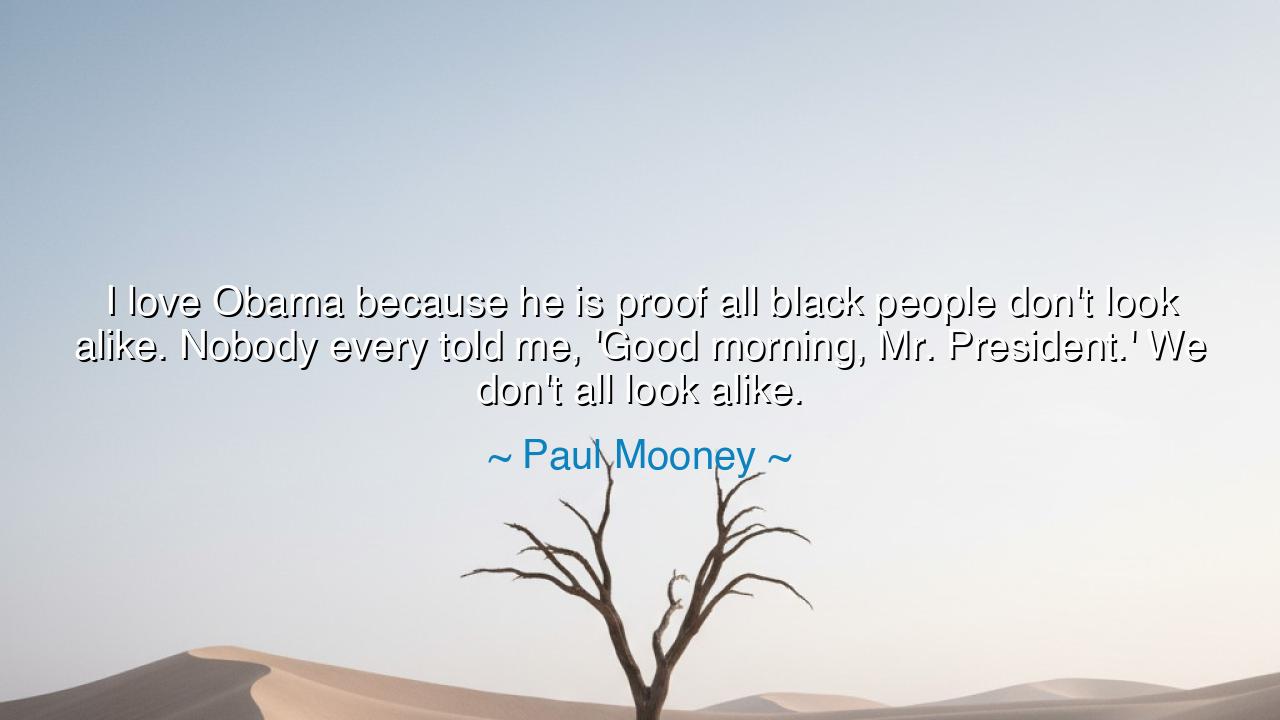
I love Obama because he is proof all black people don't look
I love Obama because he is proof all black people don't look alike. Nobody every told me, 'Good morning, Mr. President.' We don't all look alike.






In the struggle for identity, there lies a deep wisdom—a wisdom that speaks to the power of individuality and the human need to be seen for who we truly are, not just as a reflection of the categories imposed upon us. Paul Mooney, in his powerful reflection, captures this truth when he says, "I love Obama because he is proof all black people don't look alike. Nobody ever told me, 'Good morning, Mr. President.' We don't all look alike." These words are a revelation of the inherent danger in reducing any group of people to a monolithic image, and a call for the recognition of the diversity and uniqueness within every individual. Mooney’s statement calls into question not just racial stereotypes, but the greater human tendency to group and categorize based on surface-level characteristics.
In the ancient world, identity was not simply shaped by outward appearance; it was formed through action, virtue, and the unique qualities that defined a person’s character. The Greeks, who celebrated the human form in art and philosophy, understood that to see someone solely for their appearance was to miss the deeper essence of who they were. Socrates, the great philosopher, often urged his students to seek wisdom and truth beyond the surface, to look beyond the physical and into the mind and soul. His teachings were a call to recognize the individual for their thoughts and deeds, not for the simple fact of their birth or appearance. Mooney’s words echo this ancient truth: to reduce any person to a stereotype is to dishonor their full humanity.
Mooney’s admiration for Barack Obama as a symbol of individuality is deeply tied to the larger struggle for recognition in the face of historical oppression. For centuries, Black people in the United States were reduced to stereotypes, often seen as interchangeable, their identities shaped by the biases and prejudices of others. Obama, in his rise to the highest office in the land, shattered these stereotypes. He became the embodiment of diversity, not just in appearance but in thought, in vision, and in leadership. Obama proved that, despite the history of being boxed into one-dimensional categories, Black people, like all people, are diverse, complex, and deserving of recognition as individuals.
Consider the story of Moses, the great leader of the Israelites, who, though born into slavery, rose to lead his people to freedom. Despite his humble origins and his unique identity, Moses was often seen through the lens of his people’s oppression. Yet, in his leadership, Moses proved that identity is not limited by external circumstances, but shaped by vision, wisdom, and courage. Like Obama, Moses broke free from the chains of perception and proved that individuals cannot be defined by the constraints of their backgrounds. Mooney’s admiration for Obama reflects this ancient truth: that true individuality transcends the narrow definitions imposed by society.
Mooney’s statement also speaks to the importance of recognizing and celebrating the diversity of people within any group. Just as Obama’s presidency challenged the assumption that all Black people are the same, so too must we reject the impulse to categorize and label others based on superficial characteristics. In the ancient Roman Empire, emperors such as Trajan and Hadrian were known for embracing diverse cultures, not as a means of assimilation, but to acknowledge and celebrate the rich diversity within their empire. These leaders understood that the greatness of their empire was in part due to its acceptance and celebration of its diverse people. In the same way, Mooney’s words are a call to recognize the fullness of each individual—not based on preconceived ideas, but on the unique gifts they bring to the world.
The lesson for us, then, is clear and profound: each person is an individual, not a stereotype. Mooney’s admiration for Obama is a reminder that humanity is not defined by simple, reductive labels. Just as the great philosophers of the ancient world sought to understand the deeper nature of humanity, so too must we strive to see people for who they truly are, beyond the categories of race, gender, or background. To do so is to honor the diversity and complexity of the human spirit.
So, let us take this lesson into our own lives. We must resist the temptation to define people based on the surface. Let us look deeper, see the individuals before us as unique expressions of humanity, worthy of respect, understanding, and admiration. In doing so, we will not only uplift others, but we will enrich our own lives, for it is through recognizing the full spectrum of human experience that we come to understand the true beauty and depth of life itself.






AAdministratorAdministrator
Welcome, honored guests. Please leave a comment, we will respond soon